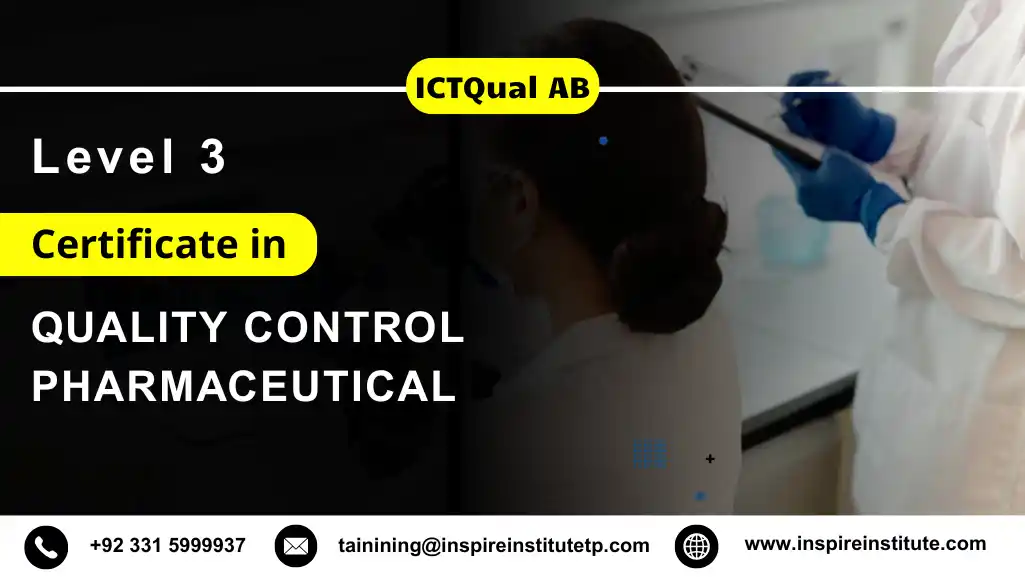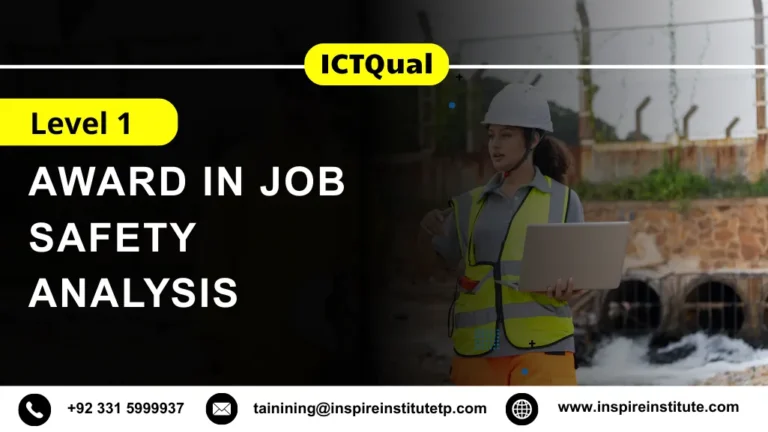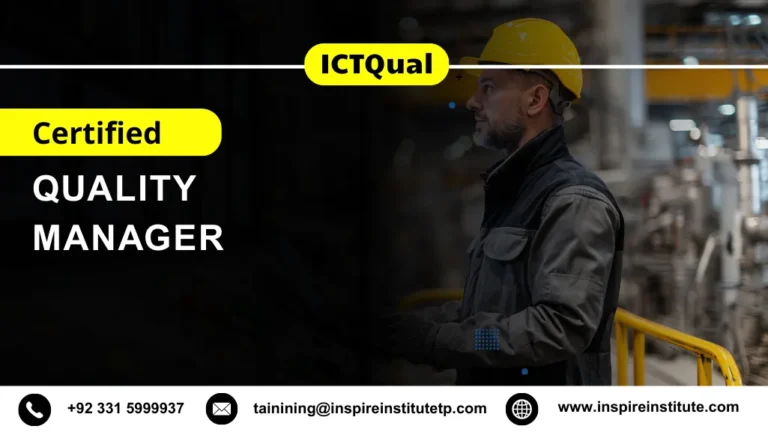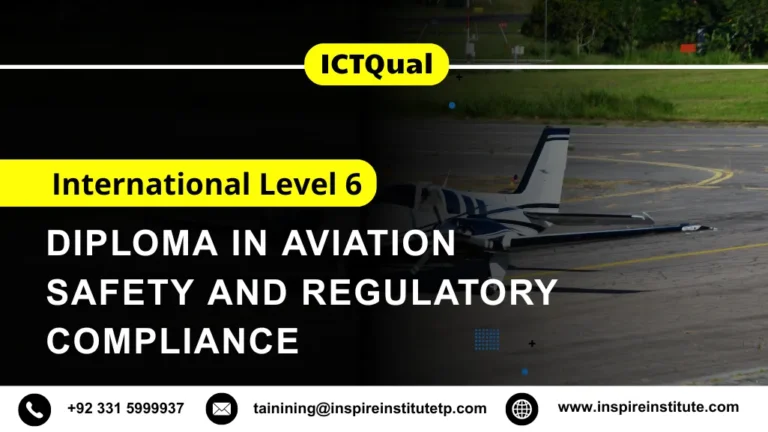ICTQual AB Level 3 Certificate in Quality Control Pharmaceutical
The pharmaceutical industry operates under strict regulatory frameworks to ensure the safety, efficacy, and quality of medicines. The ICTQual AB Level 3 Certificate in Quality Control Pharmaceutical is designed to provide learners with the essential knowledge and practical skills required to uphold these standards. This qualification prepares individuals to carry out effective quality control measures, ensuring compliance and product excellence in pharmaceutical settings.
This ICTQual AB Level 3 Certificate in Quality Control Pharmaceutical covers key topics including quality assurance principles, inspection techniques, laboratory testing, regulatory compliance, and risk management within pharmaceutical manufacturing and distribution. Learners will develop an understanding of quality control processes critical to maintaining the integrity and safety of pharmaceutical products. The programme combines theory with practical applications, aligned with current industry practices and standards.
Why Choose this Qualification
The ICTQual AB Level 3 Certificate in Quality Control Pharmaceutical is specifically designed to equip learners with the practical skills and theoretical knowledge required to maintain high-quality standards in pharmaceutical production.
Industry-Specific Expertise
Acquire a deep understanding of pharmaceutical quality control processes, including testing, inspection, and regulatory compliance aligned with global standards.
Career Progression Opportunities
Enhance your employability and position yourself for roles such as Quality Control Technician, Compliance Officer, and Pharmaceutical Auditor within the industry.
International Recognition
Earn a qualification recognised worldwide, enabling greater career mobility in the pharmaceutical and healthcare sectors.
Foundation for Advanced Study
Use this certificate as a stepping stone towards higher-level qualifications in pharmaceutical sciences, quality assurance, or regulatory affairs.
Choosing this ICTQual AB Level 3 Certificate in Quality Control Pharmaceutical demonstrates your commitment to ensuring product safety, regulatory compliance, and overall excellence in the pharmaceutical industry.
Course Overview
Awarding body : ICTQual AB
Course Level: 3
Credits : 10
Study Units: 3 Units
Evidence & Assignment Based
Qualification Structure
This qualification, the ICTQual AB Level 3 Certificate in Quality Control Pharmaceutical, consists of 3 mandatory units.
- Fundamentals of Pharmaceutical Quality Control
- Introduction to Good Manufacturing Practices (GMP)
- Pharmaceutical Sampling and Analytical Techniques
Who Should Take This Course
The ICTQual AB Level 3 Certificate in Quality Control Pharmaceutical is designed for individuals aiming to specialise in quality assurance within the pharmaceutical industry. It suits a range of learners seeking practical and recognised expertise.
- Pharmaceutical Industry Professionals:
Ideal for those currently working in manufacturing, quality control, or regulatory roles who want to formalise their knowledge and skills. - Quality Control and Compliance Officers:
Suitable for professionals responsible for maintaining product standards and regulatory compliance in pharmaceutical settings. - Career Changers:
A good option for individuals transitioning from other sectors into pharmaceutical quality control. - Recent Graduates:
Suitable for graduates in pharmaceutical sciences, chemistry, or related fields seeking specialised skills in quality assurance.
This ICTQual AB Level 3 Certificate in Quality Control Pharmaceutical is the right choice for anyone committed to ensuring the safety, quality, and compliance of pharmaceutical products.aining high-quality standards in pharmaceutical products and advancing their career within this critical sector.
Course Benefits
The ICTQual AB Level 3 Certificate in Quality Control Pharmaceutical offers valuable advantages that enhance both practical skills and career prospects.
- Practical Skills Development: Learn to perform quality inspections, laboratory testing, and compliance monitoring within pharmaceutical environments.
- Enhanced Career Opportunities: Increase your employability and qualify for roles in quality assurance, regulatory compliance, and pharmaceutical production.
- Globally Recognised Qualification: Earn a certificate valued by employers and regulatory bodies worldwide, boosting career mobility.
- Flexible Learning Options: Benefit from study methods that accommodate both working professionals and full-time learners.
Completing this ICTQual AB Level 3 Certificate in Quality Control Pharmaceutical empowers learners to uphold rigorous quality standards that ensure safe and effective pharmaceutical products.
Eligibility Criteria
The ICTQual AB Level 3 Certificate in Quality Control Pharmaceutical has entry requirements to ensure learners are prepared for the course content and assessments.
Academic Requirements
Applicants should possess a Level 2 qualification or equivalent in a relevant scientific or technical subject.
Work Experience
Experience in pharmaceutical manufacturing, laboratory work, or quality control is advantageous but not mandatory.
Language Proficiency
Learners should have a good command of English to understand course materials and complete assessments effectively.
Age Requirement
Candidates should typically be 16 years or older at the time of enrolment.
Meeting these criteria ensures learners are equipped to successfully engage with the qualification and apply their skills professionally.
The Qualification Process
The ICTQual AB Level 3 Certificate in Quality Control Pharmaceutical follows a structured and learner-friendly qualification process that blends academic study with real-world coaching skills. The process is designed to develop competent, ethical, and client-focused health coaches who are capable of supporting others in achieving sustainable lifestyle changes. Below is an overview of the key stages in the qualification journey:
• Admission and Enrolment
Learners begin by applying through an approved ICTQual AB training provider, where they must:
• Submit proof of identity and academic qualifications (typically Level 3 or equivalent)
• Demonstrate proficiency in English (e.g., IELTS 5.5 or equivalent)
• Complete a personal statement or interview (where required) to assess interest in health and wellness coaching
Once approved, learners are formally enrolled and given access to course resources.
• Course Orientation
New learners receive a full orientation that includes:
• An introduction to the course structure, units, and learning outcomes
• Guidelines on assignments, deadlines, and tutor support
• Information about coaching practice expectations and ethical conduct
• Programme Delivery
The course is delivered through a flexible format, which may include:
• Online, blended, or classroom-based learning
• Interactive webinars and tutorials
• Independent reading and research
• Practical exercises and case studies
This delivery style supports learners in balancing their studies with work or personal commitments.
• Core Areas of Study
Learners explore a broad and practice-driven curriculum, including:
• Foundations of health coaching and behaviour change
• Goal setting and action planning
• Motivational interviewing and communication strategies
• Health promotion and wellness concepts
• Coaching ethics and professional boundaries
• Reflective practice and personal development
• Coaching Practice
Though not always mandatory, learners are encouraged to:
• Apply coaching tools in real or simulated sessions
• Record and reflect on client progress
• Gather feedback to improve coaching performance
Some training centres may also include practical assessments, role-plays, or coaching portfolios.
• Assignments and Assessments
Assessment is based entirely on coursework. Learners are required to:
• Complete written assignments, reflective journals, and coaching session plans
• Submit case studies and progress reports
• Demonstrate understanding of theory through practical application
• Present evidence of learning in a structured portfolio
• Tutor Support and Feedback
Throughout the course, learners benefit from:
• One-on-one academic guidance
• Regular tutor feedback on assignments
• Coaching supervision or mentorship (depending on provider)
• Access to learning platforms and study materials
• Internal and External Quality Assurance
All assessments are:
• Internally verified by the training provider
• Externally quality-assured by ICTQual AB to ensure fair grading and regulatory compliance
This two-tier system maintains the academic integrity and credibility of the qualification.
• Certification
Upon successful completion of all course units and submission of required evidence, learners are awarded the ICTQual AB Level 3 Certificate in Quality Control Pharmaceutical.
• Post-Qualification Progression
Graduates of this diploma can:
• Begin or advance a career as a Quality Control Pharmaceutical
• Work in private practice, community health programmes, or corporate wellness
• Progress to higher-level coaching or health-related qualifications
• Seek accreditation with national or international coaching bodies (subject to additional requirements)
This structured process ensures learners graduate with the practical confidence, professional standards, and academic grounding needed to thrive as ethical and effective health practitioners in a growing global wellness industry.







